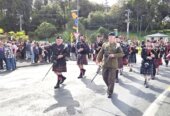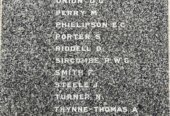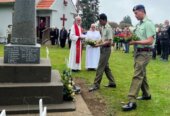
Daphiney Owen, stage name Vox Dawn, pictured at Rangiaowhia with cousin Tupou Phillips (left), is working on a new album to raise awareness of Rangiaowhia.
As a teenager, Daphiney Owen used to cruise around the rural roads of Rangiaowhia in old cars with her friends, completely unaware of the bloody massacre that took place there.
Now, many years on, the singer is working with artists from around Aotearoa to tell the story of the small Waipā settlement, where pain is still felt by the descendants of those killed.
“I was raised here; I heard of this korero, but didn’t really know it,” said Owen, also known as Vox Dawn, who grew up in Hamilton and now lives in Palmerston North with her husband.
“It’s not until now, as I’m an adult, that I’ve really understood what actually took place.”
Rangiaowhia, lying between Cambridge and Te Awamutu, was once a thriving community, home to Ngati Apakura and Ngati Hinetu people.
On February 21, 1864, British soldiers attacked the village.
There are conflicting reports about the incident, but there is little doubt that soldiers shot Māori who attempted to surrender – and later returned to loot the village. Ngati Apakura and Ngati Hinetu say that on February 21 terrified villagers fled, a few shot at the troops, some sheltered in prayer houses. Some in those houses were gunned down as they tried to get out of the building when it began to burn down and at least seven died inside.
Owen, who spoke to The News at this year’s Rangiaowhia commemorations on February 21, believes there are many around Aotearoa with little knowledge of the incident – and she wants to change that.
She and her husband have set up the Oceans Before Me trust to tell indigenous stories through music and education and have already worked on a project to raise awareness of the 1970s dawn raids in Auckland.
Now, the pair are teaming up with rangatira (leaders), established artists and school children on the 1864 Rangiaowhia Massacre Project, aiming to release a 10-track album this time next year. Every song will be about Rangiaowhia.
“The idea is to educate the next generation… a lot of our nation still doesn’t quite know what took place here… so it’s just using music as a tool to get that story out,” she said. “But also, music is healing.”
Students from Te Awamutu school Te Wharekura o Nga Purapura o Te Aroha have already contributed to one waiata, and members of a kapa haka group will feature on another.
Owen couldn’t reveal the names of other artists working on the project yet, but said they were well known.
“I can’t wait to release these songs we’ve created,” she said.








